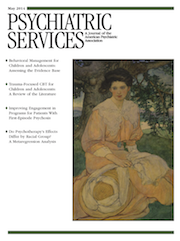Improving Mental Health Care: The Global Challenge
The book Improving Mental Health Care: The Global Challenge is a valuable compendium, edited by a troika of outstanding experts and dedicated to an international leader in our field, Michele Tansella, M.D., on the occasion of his retirement. The volume ably addresses the question, “What types of mental health care are right for the 21st century?” It takes a global perspective that focuses on achieving the right balance between community and hospital services and between specialty and mainstream services. It examines the evidence and explores a range of methods. All in all it is a successful global excursion through our varied and complex field.
The volume has 25 chapters organized into four sections: the global challenge, meeting the global challenge, new research methods, and delivering better care in the community. The authors are the leaders of mental health services research and practice throughout Europe, with a smattering of contributors from South America, Asia, and Australia. Almost entirely absent, however, are authors from North America. Some of these international authors have written in our services research journals in the United States; we have been encouraging it here, in Psychiatric Services. Some of the authors of our papers in the United States have published papers in journals elsewhere, but for the most part, our worlds have been too separated. This edited volume is an important bridge between these worlds.
In an effort to strengthen the bridge between North Americans and the rest of the world, Psychiatric Services has entered into a simple agreement with the journal edited by our honored colleague, Dr. Tansella, Epidemiology and Psychiatric Sciences (EPS). Psychiatric Services links within ps.PsychiatryOnline.org, the online platform for the journal, to the current EPS table of contents; in return, EPS links to the current contents of Psychiatric Services. It is our hope that this exchange will stimulate more cross-national consideration of mental health services research, with the objective of improving services. This agreement is born of a recent personal and professional relationship that developed between the journal editors in which we recognized our common interests. It has been our intent to expand this collegiality to the readers of both of our journals and to bring the world together into a global community.
One explanation for the separation among countries and continents is the inherently contextual nature of mental health services. Although biomedical and some psychosocial treatments can be expected to generalize to populations throughout the globe, mental health services are creatures of their own local context. Lessons learned in one country may not generalize to the experiences of mental health services in another. Improving Mental Health Care: The Global Challenge is an outstanding effort to learn from local experiences and an attempt to generalize lessons so that individuals burdened by mental disorders can recover and participate in their communities. This has been a lifelong goal of Dr. Tansella, whom this excellent book honors.



